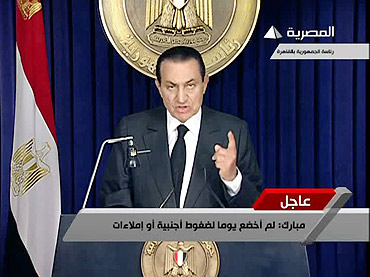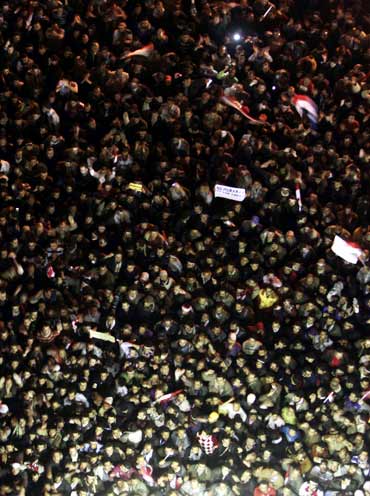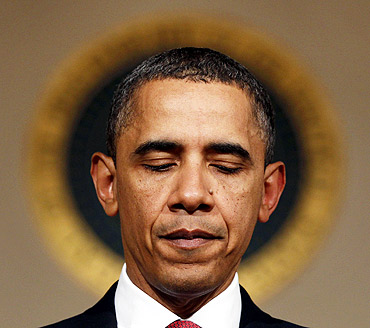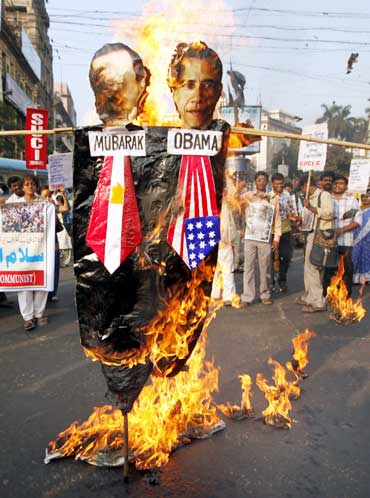Photographs: Egytian State TV/Reuters
Caught between Arab and Israeli allies who do not want Hosni Mubarak ousted immediately, and pressure within the country to push harder for his exit, the White House appeared in disarray over how to tackle the stubborn Egyptian leader who has refused to step down.
After the Egyptian President reiterated his intentions last night to stay on till September, US officials, who were expecting that he would show more flexibility are at a loss on what to do next.
After Mubarak's speech, the White House was consumed with a sense of "disbelief," one US official said, according to The Wall Street Journal.
Please ..
'Protests may get violent'
Image: Anti-government protesters in Cairo's Tahrir Square listen as President Hosni Mubarak speaks to the nation on ThursdayPhotographs: Amr Abdallah Dalsh/Reuters
The White House is stuck between Arab and Israeli allies, who do not want Mubarak ousted immediately, and other groups including several American politicians who want Obama to push harder for the Egyptian leader's exit.
"This is really bad," a senior US official was quoted as saying by the paper after Mubarak's address.
There is increasing worry that the frustrated protesters, who have so far been peaceful from their side over the 18 days of street demonstrations, could turn violent if their demands were not heeded to.
"We need to push harder if not, the protests will get violent... Every day that goes by, you have to ask: who profits by this?" Sen John McCain told the daily.
"It's the Muslim Brotherhood and other Islamic extremists. There's the perception that we're on the side of Mubarak," he said.
'Egyptians unconvinced about a serious transition'
Image: US President Barack Obama pauses as he speaks to the media following televised remarks made by Egyptian PresidentPhotographs: Larry Downing/Reuters
On Thursday night, large crowds in Tahrir Square waited in anticipation for Mubarak to step down immediately. Instead, the Egyptian leader announced that he is transferring some of his powers to Vice President Omar Suleiman, and repeated he that was not leaving until September when elections will be held.
The protestors, who were expecting a positive announcement from Mubarak, were furious.
"The Egyptian people have been told that there was a transition of authority, but it is not yet clear that this transition is immediate, meaningful or sufficient," President Barack Obama said after Mubarak spoke.
"Too many Egyptians remain unconvinced that the government is serious about a genuine transition to democracy, and it is the responsibility of the government to speak clearly to the Egyptian people and the world," he added.
US does not have much of a say in Cairo?
Image: Activists from the Socialist Unity Centre of Indiaburn an effigy depicting Mubarak and Obama during a solidarity rally in KolkataPhotographs: Rupak De Chowdhuri/Reuters
There is, however, a growing perception that Washington does not have much of a say in Cairo, WSJ said.
"The mystique of America's superpower status has been shattered," said Steve Clemons, director of the American Strategy Program of the New America Foundation, who has attended two meetings with the National Security Council on Egypt.
Arab and Israeli diplomats also pointed out that Mubarak no longer trusted the Obama administration since it had categorically sided with the opposition after eight days of the protest and just stopped short of asking him to resign.
On the other hand, the White House had been reaching out to Suleiman and the military, the newspaper pointed out.
"I don't think Mubarak trusts too many people from the US anymore," the Arab diplomat said.
"It looks like Omar Suleiman is the right point of contact, but they're all ticked off with the US position, which they view as throwing Mubarak under the bus".





article